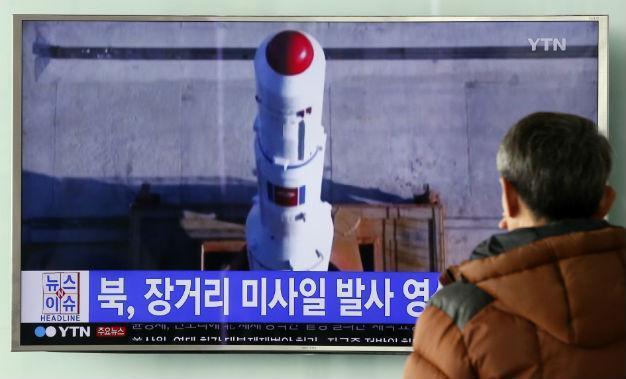North Korea expels South Koreans from industrial zone, seizes assets
SEOUL - Agence France-Presse

AP photo
North Korea on Feb. 11 expelled all South Koreans from the jointly-run Kaesong industrial zone and placed it under military control, saying Seoul’s earlier decision to shutter the complex had amounted to a “declaration of war,” while the United States and its Asian allies tightened the economic screws on North Korea.Pyongyang said it was seizing the assets of all the 124 South Korean companies operating factories in Kaesong, which lies 10 kilometers across the border inside North Korea.
In a key move, it also cut two key communication hotlines with Seoul, leaving authorities in the South scrambling to verify the status of up to 250 South Koreans believed to have been in Kaesong when the expulsion order was issued.
“We will make the utmost efforts to make sure that all our nationals return home safely,” Seoul’s Unification Ministry said in a statement.
But reporters near the border crossing said very few vehicles had passed back into the South.
The North’s aggressive measures marked a significant escalation of cross-border tensions that have been elevated since North Korea carried out a nuclear test last month and a long-range rocket launch on Feb. 7.
Seoul had announced on Feb. 10 that it was closing down operations at Kaesong, and the North said it would now experience the “disastrous and painful consequences” of that action.
By shutting Kaesong, the South had destroyed the “last lifeline” of North-South relations and made a “dangerous declaration of war,” the North’s Committee for the Peaceful Reunification of Korea (CPRK) said in statement.
The North also said it had ordered a “complete freeze of all assets,” including raw materials, products and equipment.
The owners of the South Korean companies in Kaesong had sent more than 100 empty trucks into the North on the morning of Feb. 11 in the hope of bringing out as much as they could.
Several people who crossed into the South early in the morning said they had noticed an increased military presence in Kaesong, including armed soldiers carrying backpacks and sleeping bags.
Despite the ban on removing anything beyond their personal belongings, a few trucks that managed to cross the border around the time of the expulsion order were carrying factory materials.
Meanwhile, the United States and its Asian allies tightened the economic screws on North Korea, with the U.S. Senate adopting fresh sanctions.
The unilateral moves, which included Japanese sanctions, came with U.N. Security Council members still stalled on how far to go in punishing the North for its latest nuclear test and long-range rocket launch.
U.S. Assistant Secretary of State Daniel Russel welcomed Seoul’s initiative.
“More steps are needed to convince the [North Korean] leadership that it is not going to be possible to have access to the international economic system let alone economic or financial aid as long as North Korea continues to pursue nuclear and missile programs,” Russel said.
The U.S. Senate later voted unanimously to adopt a bill expanding sanctions.
The measure, which must be reconciled with a similar House version that passed last month, would punish any person or entity importing goods, technology or training related to weapons of mass destruction, or engaging in human rights abuses.
Penalties would include the seizure of assets, visa bans and denial of government contracts.
It also aims to cut down on money laundering and narcotics trafficking - two major illicit activities believed to be funneling millions of dollars into leader Kim Jong-Un’s inner circle.
“This dictatorial regime must learn that its actions have consequences,” said House Speaker Paul Ryan.
Japan also unveiled unilateral measures on Feb. 10, including prohibiting North Korean ships from entering Japanese ports and a total entry ban on North Korean nationals into the country.
North Korea’s main diplomatic protector, China, has been resisting the U.S.-led push for tougher U.N. sanctions.
Although fiercely critical of Pyongyang’s nuclear ambitions, Beijing is more concerned at the prospect of Kim’s regime being pushed to collapse - triggering chaos on China’s border.
















